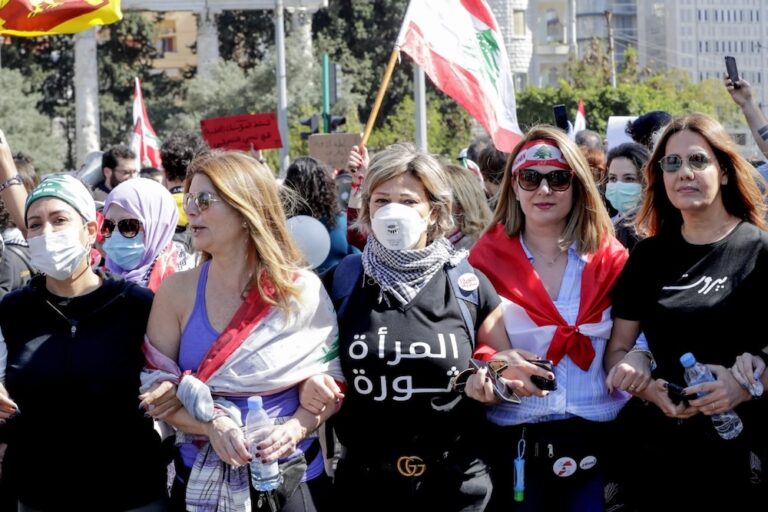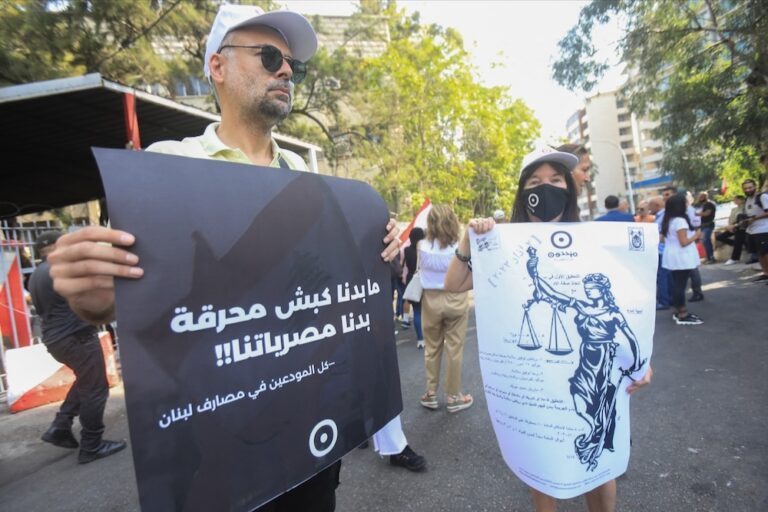(WAN/IFEX) – The following is a 24 November 1998 WAN press release on the occasion of its Board meeting in Beirut, Lebanon, 23 to 24 November: Beirut, Lebanon, 24 November 1998 For immediate release Publishers Ask Lebanese Prime Minister To Overturn Press Law The World Association of Newspapers (WAN), in a meeting with Lebanese Prime […]
(WAN/IFEX) – The following is a 24 November 1998 WAN press release on the
occasion of its Board meeting in Beirut, Lebanon, 23 to 24 November:
Beirut, Lebanon, 24 November 1998
For immediate release
Publishers Ask Lebanese Prime Minister To Overturn Press Law
The World Association of Newspapers (WAN), in a meeting with Lebanese Prime
Minister Rafiq al-Hariri, has called for the abolition of Lebanon’s press
law.
“You do not have a fully free press here,” said WAN President Bengt Braun,
who headed a delegation of a dozen editors and publishers from Europe, South
America and Asia who were in Beirut for the Board meeting of WAN, the
association of the world’s newspaper industry, 23-24 November.
Prime Minister Hariri denied there was any censorship in Lebanon. “I believe
in the free press,” he said. “The reality in this country is, you can
criticise anybody you want, you can criticise anything you want.”
In response, WAN drew attention to provisions of the press law, which
imposes fines for criticising foreign heads of state.
“All countries have their problems, but we believe that the problems are
best dealt with in a totally free debate which allows all views and opinions
to be expressed,” said Mr Braun.
He also said the Prime Minister’s comments about supporting a free press
should be followed by abolition of the press law. “The effect of taking away
the law would have a fantastic impact on journalists here,” he said.
Mr Hariri said it was not possible to change the law until there was more
democracy in the Middle East. He contended that if journalists were
practicing self-censorship, it was not the fault of the government, which
had not, he claimed, taken action to enforce the law.
WAN Director General Timothy Balding told him that “in the eyes of your own
journalists — and we trust their judgment — they consider it censorship.”
Mr Hariri also asked the publishers to consider Lebanon’s recent history of
civil warfare and its position in the Middle East, surrounded by
undemocratic neighbors. The publishers said that freedom of expression was
central to the democratic process.
“The importance for us is the conviction that, in each of our countries,
freedom of the press and freedom of expression is an important part of
present society,” said Jayme Sirotsky of Brazil, the former WAN President.
“If you want democracy, you have to have freedom of the press.”
The WAN delegation was composed of Mr Braun, President & CEO of Sweden’s
Bonnier Group, Mr Sirotsky, Chairman of the Board of Brazil’s RBS, Mr
Balding, Pedro Ramirez, Editor of Spain’s El Mundo, Alvin Sold, Director and
Editor of Luxembourg’s Tageblatt, Gebran Tueni, Publisher and General
Manager of Lebanon’s An Nahar, Theodor Gut, Publisher of Switzerland’s
Zurichsee Zeitung, David Palmer, Managing Director of Ireland’s Independent
Newspapers, Hisao Komatsubara, representing the Japanese Editors and
Publishers Association (NSK), Eberbard Ebner, the Publisher of Germany’s
Sudwest Presse, and Larry Kilman, the WAN Director of Communications.
WAN, the global association of the newspaper industry, represents 15,000
newspapers world-wide. Its membership includes 57 national newspaper
associations, individual members from 90 countries, seven regional press
organizations and 17 news agencies.
Iraj og Hege Nouri
Torstadbakken 29, 1364 Hvalstad – NORWAY
Tel: 66 98 08 69
e-mail: hnouri@online.no
mese government to free
political prisoners. And he called on journalists’ organisations and press
groups to work with journalists in Vietnam and in the overseas Vietnamese
communities to improve journalistic standards “so they have the talents to
make freedom of the press a reality.”
The WAN Board presented Mr Hoat with a pen — an appropriate gift for
someone who didn’t have one for four years. Mr Njawé received a photograph
of himself taken secretly while he was in prison and which was used by WAN
to draw attention to his plight.
WAN, the global association of the newspaper industry, represents 15,000
newspapers world-wide. It’s membership includes 57 national newspaper
associations, individual newspaper executives in 90 countries, seven
regional press organizations and 17 news agencies.
For further information, contact Larry Kilman, Director of Communications,
WAN, 25 rue d’Astorg, 75008 Paris France. Telephone: +33 1 47 42 85 00, Fax:
+33 1 47 42 49 48. E-mail: lkilman@wan.asso.fr. Telephone in Beirut until 25
November: Beirut Marriott, +961 1 840540


